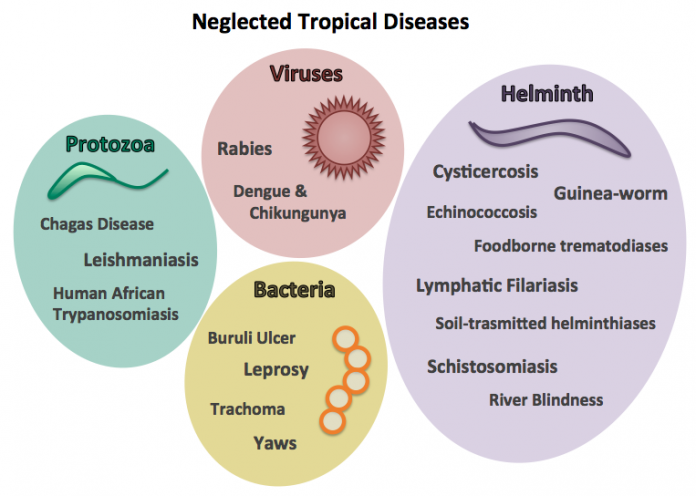Schistosomiasis, River blindness, Leprosy and Elephantiasis are types of sicknesses often regarded as Neglected Tropical Diseases (NTDs). They may not sound familiar to us, as they are not the well known common sicknesses often talked about, but they affect over 1.5 billion persons around the world, including about 800 million children, while leaving majority dead and several others disabled, disfigured or blinded, with other victims faced with lifetime health issues they may never recover from.
Despite not mostly talked about, Africa has about 40 per cent of the burden of the scourge globally, with Nigeria representing the most endemic nation of NTD on the continent, as available information suggests that over 100 million Nigerians are at risk of the diseases, representing 25 per cent of Africa’s burden of a scourge which the World Health Organisation (WHO) had stressed over time that they are preventable and treatable.
This no doubt has cut short the lives of some Nigerians, while those who have been lucky to fight through any of the neglected diseases are left at the mercy of the consequences of the scourge. This is as experience has shown that if not well treated or managed, NTDs often leave tales of pain, sorrow and tears, even for those who have managed to overcome it.
The group of diseases, which experts have stressed that three in every five Nigerians were at risk of, is termed neglected tropical diseases because they affect the poorest, most marginalised and least visible populations (often living in remote rural areas, conflict zones or urban slums), as the diseases are generally missed out when health agendas and budgets are set.
Infact they were not even mentioned in the Millennium Development Goals, a set of targets agreed by world leaders to make a difference to the poorest and most underdeveloped countries by 2015. This is despite one sixth of the world’s population infected with one or more NTDs and another two billion people are at risk. As well as thriving in conditions caused by poverty, NTDs also make it extremely difficult to escape from it, so it is a vicious cycle. River blindness and LF are two major NTDs in sub-Saharan Africa.
This, no doubt has, according to experts, caused the increased incidence rate of the group of diseases in Nigeria, with arguments tilting towards inability of the government, stakeholders and health bodies to give it a priority, despite its ravaging features.
Sharing his thoughts a Professor of virology based in Massachusetts, Prof. Kinglsey Ekot said one of the reasons why the diseases are becoming prominent in Nigeria and Africa at large was because priority has not been given to it as they are being given to Malaria, tuberculosis and human immuno-virus.
He stated that in fact, what the continent has been loosing from giving less priority to the group of diseases can be restored and gained if priority is given to eradicating the various diseases from the country.
“If NTDs are really controlled on or before the year 2020 as targeted by WHO and its member countries, this would mean that sub-Saharan Africa can save $52 billion between 2011-2030, while Nigeria will save more than 20 per cent of that money.
“Imagine what we can spend that money on. It could help in saving the healthcare, as well as on other areas to boost the economy of the country,” adding that, “Nigeria alone can save about $12 billion, which will in turn save millions of lives that would otherwise be lost to sicknesses occasioned by the various neglected diseases.”
He believed there are drugs, treatment plans and even prevention methods that can help in reducing the prevalence level in the country and Africa at large, but that delivering the treatment plans and drugs have been hampered by lack of information on where those affected are, lack of infrastructure to distribute the medicines to remote areas and a system to track progress, and generally lack of awareness by stakeholders on how to prevent and manage these diseases.
According to him, to be able to reduce this scourge in Nigeria and other African countries, there must be conscious efforts by the government, stakeholders and health bodies to scale up interventions, funding and increase technical capacity. “The battle to eliminate the NTDs in our view, must be led by affected countries and for us in Nigeria, with high poverty rate where constant illness is an everyday reality for many of our people who live in squalid conditions with no access to potable water, healthcare facilities and poor sanitation habits, we do not have much of an option than key into this, considering that most of the diseases in this category are fueled and worsened by poverty,” he added.
He described NTDs as a group of parasitic and bacterial infectious diseases that cause severe pain, long-term, disability, social isolation, Anaemia and maternal mortality. “In children, NTDs leads to malnutrition, cognitive impairment, stunted growth and the inability to attend school by the children.”
He called on Nigeria to play a leading role in tackling the scourge in Africa. “We experience the bigger burden of the disease in Africa, hence we must put all measures on ground to solve the issue because NTDs are becoming a growing concern which must be tackled holistically.
“Among other areas which the Ministry of Health has been been trying to work on, they must as a matter of importance give priority to tackling NTDs in the country because the number of cases being experienced are increasing. Something should be done to curb or reduce it drastically,” he added.






